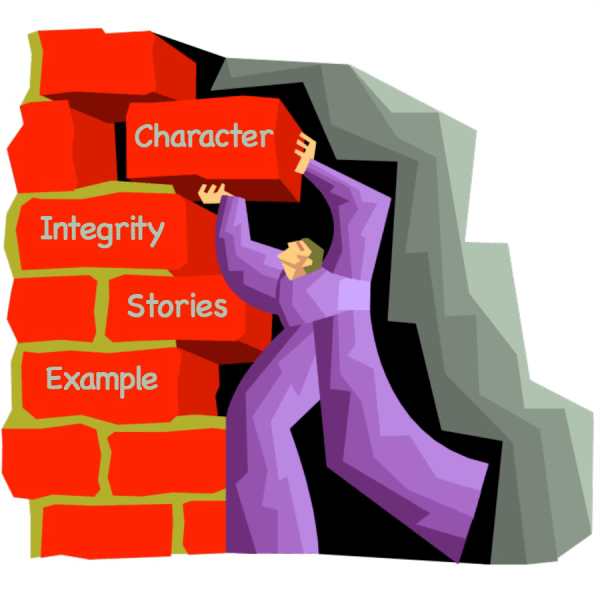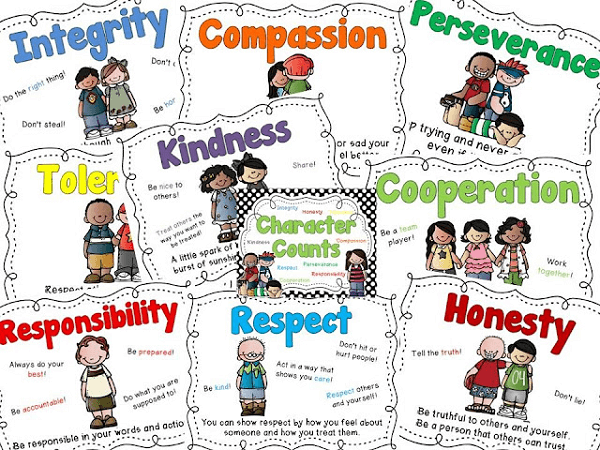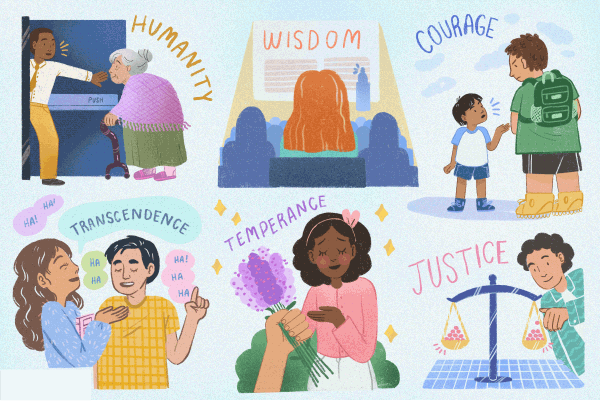Character DefinitionThe character of a person or place comprises all the features they have that make them different from other individuals or places. 
According to the dictionary, a character is "a person, animal, or creature inside a story," whether the story is found in a book, play, film, or another form of art. A narrative may have a few characters or one. Characters In StoriesThere cannot be a story if there are no characters. Despite the fact that landscape alone may be utilized in novels without any particular characters or creatures, authors frequently personify the location and make it into a different character. Writing is nearly impossible without a main character to move the plot along. These people or entities usually go through some kind of struggle that needs to be resolved as the tale comes to an end, especially with book characters. This could be an internal conflict that the protagonist must overcome on their own or an external conflict with one or more of the supporting characters presented throughout the story. Consider ways to elicit an emotional response from your audience while developing character concepts for your own story. It's important to keep in mind that not all of it has to be good. The antagonist or anti-hero of the narrative is frequently one of the most adored literary characters of all time. For example, Lord Voldemort from Harry Potter and Moriarty from Sherlock Holmes are characters we, as readers, love to despise, yet the story wouldn't be complete without them. What is an Example of a Character?Characters may be based entirely on fiction or real persons. Authors like Jane Austen were renowned for creating characters who were remarkably true to life and frequently based on individuals she knew and observations of the society she lived in. Little Women author Louisa May Alcott modeled the book's characters on her own family, and many have speculated that Jo March was a fictionalized version of herself. 
Various character types have a variety of characteristics that pull in and hold the audience's interest. They may have a specific function, such as instructing or amusing the reader, or they may be there to assist the main character in their trip. 7 Character Types in StoriesThe protagonist, the antagonist, the love interest, the confidant, the deuteragonists, the tertiary characters, and the foil are just a few character types that may be categorized based on their role in a story. 
1. ProtagonistThe protagonist is the story's central figure. They ought to have a well-developed past, unique motivations, and a character arc that develops during the course of the narrative. Frequently, the tale will be told from their perspective. The protagonist is the figure in a story that the audience is most attached to, whether she is a heroine like Katniss Everdeen in The Hunger Games or a sad misery like Underground Man by Dostoevsky. 2. AntagonistAn antagonist is a story's main bad guy. Consider Dr. Charles Nichols from The Fugitive, Lex Luthor, or Lord Voldemort. It's important to remember that an adversary is not the same as an anti-hero like the Joker or Walter White. A protagonist's antagonistic counterparts are known as anti-heroes. 3. Love InterestThe main character's object of want is the love interest. An excellent love interest will be intriguing and three-dimensional, like Rhett Butler in Gone With the Wind or Daisy Buchanan in The Great Gatsby. 4. ConfidantSancho Panza to their Don Quixote, this kind of character serves as the protagonist's best friend or sidekick. Although not every narrative requires one, the confidant frequently helps the protagonist achieve their objectives. Two notable confidants are Horatio from Shakespeare's Hamlet and Hermione from Harry Potter. 5. DeuteragonistsCharacters who frequently cross paths with confidants. A deuteragonist is near the protagonist but whose character journey is not directly related to the tale's action. Horatio serves as a deuteragonist as well. Samwise Gamgee plays the role of the deuteragonist in Tolkien's Lord of the Rings trilogy. Benvolio is a deuteragonist who also serves as a confidant in Shakespeare's Romeo and Juliet, whereas Mercutio is a deuteragonist but not a confidant. 6. Tertiary CharactersTertiary characters are those who appear in the story's universe but are not necessarily related to its primary plot. These supporting players might have varied levels of personal dynamism and can fulfill a variety of purposes. In The Brothers Karamazov, Father Zosima or Padma and Parvati Patil from the Harry Potter books come to mind. In Spider-Man, a number of peripheral individuals contribute to the development of Peter Parker's New York. 7. FoilA foil character mainly serves to highlight the positive traits of the protagonist. This is so because the foil is essentially the antagonist of the protagonist. As Captain Kirk and Mr. Spock's personalities are so distinctly different, they act as each other's foils in the Star Trek television series. Draco Malfoy serves as Harry Potter's antagonist. Another Meaning of CharacterApart from story and drama characters, character can have a different meaning too; Character also implies to personality and qualities of a human being. Your character in life makes people believe in you and is important to individual success and the successful functioning of our society. Every man must do his part every day by an honest life. Integrity is following a moral code of honesty, courage, strength and truthfulness - being true to one's word. If you don't show honesty, other people get hurt. But you hurt yourself even more. If you cheat, your "success" is false. If you break a promise, you show that your word is meaningless. When you lie, you betray others and lose their respect. All these examples destroy your reputation and break others' trust in you. With your good reputation and reliability, your relationships will be successful. What are Character Traits?Character traits are discrete elements of one's personality and conduct, defining who they are. These aspects of one's personality help a hiring manager understand how they interact with people and achieve tasks. One may increase their chances of being recruited and offer prospective employers a better impression of their abilities or personality by emphasizing their strongest and most pertinent character attributes in their CV and interview. 15 Examples of Character TraitsThere are a variety of character qualities that might support job success, but the following are some of the most important ones for professional advancement: 
1. AmbitiousAn ambitious person has a strong desire to succeed through achieving their objectives. When you work diligently and tenaciously to overcome obstacles or surpass organizational goals, you may be exhibiting ambition. Ambition may also refer to taking on more work or exerting more effort to achieve your goals. 2. CreativeA creative person may create something by using their imagination. Creativity is more than just necessary for positions in the arts. Creativity is required to create better methods to execute chores, solve a challenging problem, or present information in a clear, engaging way. 3. CompassionateA compassionate individual is capable of experiencing and expressing sympathy for others. When you assist a coworker in overcoming a difficult obstacle or offer emotional support to someone going through a difficult moment, you may be displaying compassion. In any profession, employers are looking for people who demonstrate compassion. Still, it may be especially beneficial for those who want to work in customer service or other client-facing areas. 4. ConscientiousA person with conscientious characteristics is careful and deliberate in their actions. They strive to carry out responsibility and do what is right. Conscientious people are more disciplined and work harder to finish each assignment to the best of their abilities. 5. CourageousA courageous employee is unafraid of obstacles and problems. They are more prone to take on tasks that others would avoid because they are difficult or time-consuming. They could also be more willing to take calculated risks at work, which might benefit the business and lead to discovering fresh concepts or tactics. 6. FlexibleAdaptable people can adjust their ideas rapidly in response to changing customer requirements or reduced project deadlines. You may thrive in fast-paced positions and businesses if you have the capacity to adapt your behavior in response to changes in the work environment. To guarantee that they can do their jobs even while confronting novel concepts or settings, many companies search for flexible workers. 7. HonestAn honest individual comes off as sincere and truthful and could not feel at ease engaging in dishonest behavior. Sincerity is necessary for all jobs, but it's crucial in highly regulated fields like banking and health care. The experts' honesty is required for many positions that have ethical requirements. 8. HumbleHumble people may practice being modest and keep it throughout their lives. They behave politely when receiving praise or acknowledgment and refrain from bragging about their successes. Many leaders exhibit this quality to guarantee that the team as a whole receives credit for reaching a goal. 9. Honorable (Integrity)Someone who is honorable has integrity and behaves morally and ethically. Honest workers make sure they constantly act in a way that promotes the organization where they work. Businesses and jobs that depend on brand partnerships and general impressions frequently search for honorable people that uphold the organization's principles and ethics. 10. LoyalA devoted worker supports a company's goals and objectives. Someone loyal may be trusted with private information and work for a firm for a long time. Businesses frequently value loyalty since it helps them save money and cuts down on the time and resources needed for employee turnover procedures. 11. PatientThose who are patient may endure setbacks, delays, or unforeseen problems without becoming agitated or furious. If you work in a position where it may take a while before you see the fruits of your labor, like managing a marketing team or campaign, you need to have patience. Since it may enhance the workplace and foster a healthy culture, patience is highly valued by both employers and employees. 
12. PersistentPersistence is a quality that employers look for in their employees. Whatever challenges or barriers they encounter on their journey are met with a determination to continue on their course. A person who works in sales, journalism, public service, or law can benefit greatly from having persistence as a quality. 13. ResilientA resilient person is one who can fully recover quickly from setbacks, stress, unfavorable circumstances, or unexpected changes. When you fail to accomplish a goal as an employee, for instance, but promptly come up with a strategy to surpass your next aim, that is an example of resilience in action. If you possess this quality, you will be able to operate more effectively and with a cheerful mood. 14. DisciplinedProcrastination and self-doubt are two temptations that someone with self-discipline may fight to stay on the right track. Hardworking employees that practice self-discipline frequently require little to no supervision. Progressive discipline is necessary for many leadership positions and jobs with high levels of independence. 15. CuriousCuriosity is an important personal quality that can motivate someone to seek out or pick up new knowledge, talents, and skills on their own. Curious employees are recognized for their capacity to autonomously encourage themselves to learn and advance in their positions and fields of endeavor. Curiosity is a key component of many different work kinds, particularly open-ended, flexible, and strategic positions. The Benefits of a Good Character
1. Trust is attracted to characterOthers view highly moral people as reliable. People also lower their barriers and open up when they are trusted. 2. Influence comes from your characterThis is connected to the preceding point. Someone who trusts you is much simpler to persuade than someone who doesn't. Strong character individuals sincerely want what is best for others. They have a beneficial impact on other people as a result. 3. Character leverages failuresPeople of strong character understand that failures are not final; they are bumps in the road and wonderful learning experiences. Therefore, they try to learn pearls of lessons from each failure. 4. Successes are maintained through characterStrong-willed people maintain their modesty even when they succeed. They are prevented from falling from a great height because they remain grounded. 5. Character endures under difficult circumstancesThose with strong character persevere when things get difficult. They keep doing the right thing even when they don't feel like it. 6. Character stands in the face of oppositionStronger character traits allow people to stay loyal to themselves. Despite criticism and hardship, they stand up for what they cherish and truly value. Others may first judge you primarily on what is visible on the surface, just like the iceberg. But, ultimately, people look closer and get to know your character. Much of your long-term success will come from having a strong character. True success will come when you continue to concentrate on strengthening your character. SummarySuccess depends on the character since it determines our authenticity. We are made by it. What will help you stand out positively is being conscious of your character. Meanwhile, as an individual, resist the urge to place the responsibility for lack of ethics and character on others (those who are professionally above, on a par with, or below you); instead, resolve to uphold the standards you would want others to follow. The most valuable thing you own is your good character. It takes years to develop yet may be destroyed in an instant. It's hard to get it back after you've lost it. While no one else is looking, you show your actual self. People frequently make decisions based on immediate benefit or an easy solution to a problem and do it incorrectly.
Next TopicCheque Definition
|
 For Videos Join Our Youtube Channel: Join Now
For Videos Join Our Youtube Channel: Join Now
Feedback
- Send your Feedback to [email protected]
Help Others, Please Share










